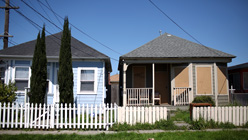Opponents in both houses cast the legislation as an invitation to frivolous lawsuits. They said it would lower home values by creating uncertainty in the real estate market. "This will be a field day for trial attorneys," said Doug LaMalfa, R-Butte.
But Mark Leno, D-San Francisco, a sponsor of the legislation, argued that the bill had been narrowed so that lenders could avoid being sued if they follow the law.
The protections would benefit all California homeowners, not just those whose mortgages are with the five banks that signed the national settlement in February. And many of the restrictions would become permanent, while those in the nationwide agreement will end after five years.
Jose Vega drove 70 miles to Sacramento with his two young children to lobby lawmakers to pass the legislation after he spent three years battling to keep his home in the San Francisco-area city of Pittsburg.
In November 2009, he said he found a trustee sale notice posted on his door 16 days after he was placed in a loan modification program. He was put into another modification program in the spring of 2010, only to have the bank again begin foreclosure proceedings.
Vega, 52, eventually kept his home after filing for bankruptcy and getting help from the office of Democratic U.S. Sen. Dianne Feinstein. Now he and his family owe $466,000 _ including the bank's legal fees _ on a home he said is worth about $200,000.
``I'm not asking for a handout. All I'm saying is, you created this mess, let's work something out,'' said Vega a member of the Alliance of Californians for Community Empowerment. ``Hopefully, California will lead the way so other states will follow.''
Attorney General Kamala Harris said the compromise legislation negotiated with lawmakers ``is going to bring transparency and fairness to California homeowners in a way they've never had before.''
She helped negotiate the February settlement that requires Bank of America Corp., JPMorgan Chase & Co., Wells Fargo & Co., Citigroup Inc. and Ally Financial Inc. to pay $18 billion in penalties to California homeowners.
Key portions of her original proposal to write the settlement into state law were stalled by opposition from some of her fellow Democrats in the Legislature, until the right to sue banks and other measures were significantly narrowed.
``This legislation can be the catalyst not only for a recovery of California's real estate market, but a catalyst across the nation as borrowers everywhere will demand the same protections given to California borrowers, the same protections given to our families,'' said Assemblyman Mike Feuer, D-Los Angeles, a member of the conference committee that negotiated the bill. ``And those protections boil down to this: They ought to be treated fairly, they ought to be treated consistently.''
Lenders' organizations joined by the California Chamber of Commerce said in a letter to lawmakers on Friday that the final legislation is an improvement, though they still fear it will ``encourage frivolous litigation'' by borrowers who cannot realistically afford to stay in their homes.
The lending industry cited a study it commissioned by Beacon Economics, a Los Angeles-based research firm. It echoes industry arguments that letting homeowners sue their lenders, even in limited circumstances, will delay foreclosures and increase lenders' costs, potentially harming the shaky housing recovery and making it more difficult and costly to obtain mortgages.
The legislation can't address what lenders say is the underlying problem: too many borrowers can't afford their payments.
``If we extend this, what we're doing is making a bad situation worse,'' Assemblywoman Diane Harkey, R-Dana Point, said in arguing against the bill.
Supporters of the bill say it still takes important steps.
``The point is ... not to launch an avalanche of lawsuits. What it's really about is having some meaningful accountability to ensure that servicers follow the rules,'' said Paul Leonard, director of the California office of the Center for Responsible Lending, a consumer group.
Previous efforts have repeatedly failed to clear the Legislature. Leonard said the national mortgage settlement and Harris' involvement are likely to make the difference this year.
Sen. Noreen Evans, D-Santa Rosa, who co-chaired the conference committee that negotiated the bill, said Brown's administration worked with Democrats on the legislation and has given every indication he would sign it into law. However, Brown declined to comment as he left the office of Senate President Pro Tem Darrell Steinberg, D-Sacramento, moments before the vote.
